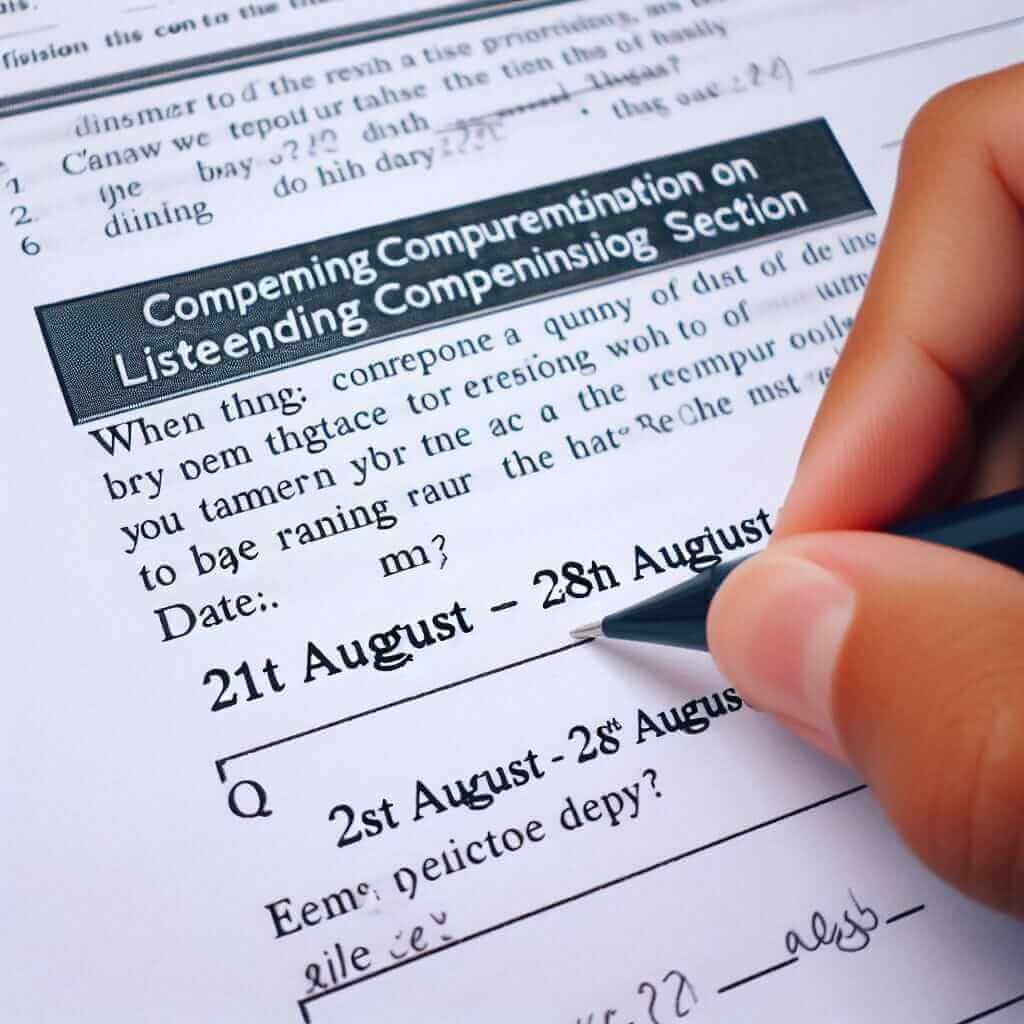As an IELTS instructor with over 20 years of experience, I often find students struggling with seemingly simple aspects of the Listening test, particularly when it comes to accurately noting down dates and times. While this might seem trivial, even a small error can lead to a lower score. Don’t worry, though! With the right approach and a bit of practice, you can master this skill and boost your IELTS Listening score.
Why Accurate Date and Time Transcription Matters in IELTS Listening
The IELTS Listening test assesses your ability to understand spoken English in various contexts. Accurately transcribing dates and times demonstrates:
- Attention to Detail: It highlights your ability to focus on specific information, a crucial skill for academic and real-life listening situations.
- Short-Term Memory: You’ll need to retain the information briefly while simultaneously processing the rest of the audio.
- Comprehension of Numerical Information: This is vital for understanding statistics, figures, and of course, dates and times in different accents and speech styles.
Effective Techniques for Writing Dates and Times in IELTS Listening
Here’s a breakdown of strategies to help you accurately transcribe dates and times:
1. Anticipate the Information
- Question Types: Be prepared for question types that often require noting dates and times, such as form-filling, note-completion, and sentence completion.
- Contextual Clues: Pay attention to keywords and phrases that signal upcoming dates or times, such as “on,” “in,” “during,” “starting from,” “ending on,” etc.
2. Recognize Different Formats
Be familiar with various ways dates and times are expressed:
Dates:
- British English Format: Day/Month/Year (e.g., 15th June 2023 or 15/06/2023)
- American English Format: Month/Day/Year (e.g., June 15th, 2023 or 06/15/2023)
- Spoken Forms: “the fifteenth of June,” “June the fifteenth,” “the fifteenth,” etc.
Times:
- 24-Hour Clock: 14:00 (2 pm)
- 12-Hour Clock: 2:00 PM (afternoon)
- Informal Expressions: “half past two,” “quarter to three,” “ten past eleven”
3. Develop Efficient Shorthand
Create your own system for quickly jotting down dates and times without losing track of the audio:
- Abbreviations: Use “Jan,” “Feb,” “Mon,” “Tues,” etc.
- Numbers: Note only the essential digits (e.g., “15/6” for “15th June”).
4. Practice Active Listening
The key is to train your ear to pick out specific information. Practice with:
- Mock Tests: Replicate exam conditions to build stamina and familiarity.
- IELTS Listening Practice Materials: Focus on tasks that involve dates and times.
- Recordings with Transcripts: Check your accuracy and identify areas for improvement.
Example from an IELTS Listening Test
Audio:
“The exhibition will be held over two weekends, starting on Saturday the 21st of August and ending on Sunday the 28th.”
Question:
What are the dates of the exhibition?
Answer:
21st August – 28th August

Essential Tips for Success
- Stay Calm and Focused: Don’t panic if you miss a detail. Move on and try to catch the next piece of information.
- Use the Transfer Time: You’ll have time after each section to transfer your answers. Double-check your dates and times for accuracy.
- Be Mindful of Spellings: While minor spelling errors might be overlooked, ensure clarity, especially when distinguishing between similar-sounding months like “June” and “July.”
Conclusion
Mastering the art of accurately transcribing dates and times in the IELTS Listening test requires practice, attention to detail, and a strategic approach. By implementing these techniques and tips, you’ll gain confidence, improve your listening comprehension, and ultimately enhance your overall IELTS score. Remember, consistent effort is key to achieving your desired band score. Good luck!